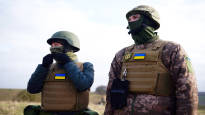The Finnish officer does not rule out the possibility that training could also be given in Finland in the future.
Finland’s 50-person department will most likely start training Ukrainian soldiers in late spring or early summer, says the senior officer of the Ministry of Defense Mikko Lehto.
According to Lehto, it is also possible that the start of the training will be extended into the fall. The schedule depends on the situation of the Ukrainians, i.e. when they can detach themselves from their military duties in Ukraine.
Within a couple of weeks, the President of the Republic will issue an order according to which Finland will participate in the training operation coordinated by the EU.
Since the fall, Finland has had a group of twenty people who have given military training to Ukrainians in Britain. The new group of trainers will do their work with these prospects in Poland, which is becoming a center for military training, Lehto says. With the new team, the number of trainers will increase to 70
Finland provides Ukrainians with training in the use of weapon systems and medical duties. Ukraine does not need help with all the weapons systems that Finland has the know-how for, Lehto states.
– For historical reasons, we have owned a lot of the kind of equipment that Ukraine uses today. They have such competences in their own organization, just like ours, even though we have mostly removed the old Soviet equipment, Lehto describes.
The EU coordinates the aid
The quality of educational aid is determined by Ukraine’s needs. Negotiations on the quality of aid are conducted centrally by the European Union and Ukraine. The EU countries then discuss with each other which country has the best know-how that most effectively serves Ukraine’s needs.
Lehto considers it possible that Finland would eventually increase the number of trainers.
– We monitor very closely what that need is. Yes, I believe that this will be looked into in the future, when we know what else is needed.
Lehto emphasizes that it is not the number of trainers that is decisive, but the quality of the training.
He also does not rule out the possibility that training could also be given in Finland.
– I don’t dare to evaluate it. When we first get this phase started, we then have to look at what the other needs are and where it is most appropriate to implement them. Now it seems that Poland has become such a hub [keskuspaikka]when it is in that immediate vicinity, Lehto ponders.
